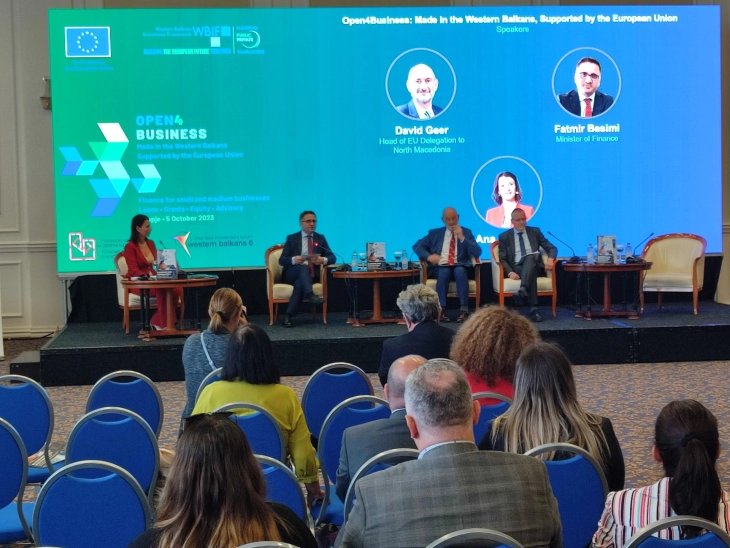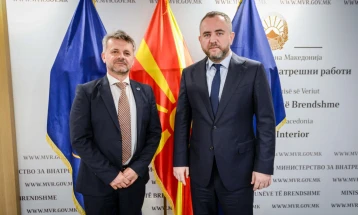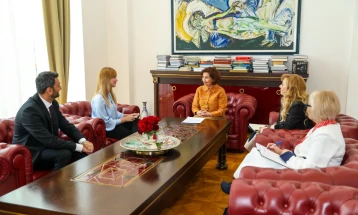Small and medium-sized companies have potential to foster economic growth, EU financial instruments available
- Potential of micro, small and medium-sized companies (MSMEs) in the region and the support by the EU to foster their growth was the focus of the regional "Open4Business - Made in the Western Balkans - Supported by EU” hybrid event organized by the European Commission in cooperation with the Economic Chamber of North Macedonia and the Western Balkans 6 Chamber Investment Forum (WB6 CIF).

Skopje, 5 October 2023 (MIA) – Potential of micro, small and medium-sized companies (MSMEs) in the region and the support by the EU to foster their growth was the focus of the regional "Open4Business - Made in the Western Balkans - Supported by EU” hybrid event organized by the European Commission in cooperation with the Economic Chamber of North Macedonia and the Western Balkans 6 Chamber Investment Forum (WB6 CIF).
In his address at the forum, EU Ambassador David Geer underlined that small and medium-sized enterprises (SMEs) are essential drivers of sustainable economic growth, whereat they make up 99% of all firms, nevertheless, 2020 OECD analysis shows that SMEs across the region continue to face obstacles such as difficulties accessing financing, low levels of digital uptake and low participation in international trade.
“We have a wide range of financial instruments. We have funds amounting to €600 million. There are financial institutions on the ground to ensure that companies have funding for research to develop new products, to penetrate new markets and to scale up green and digital efforts. These are the goals of the economic investment plan,” Geer said.
It is essential, he added, that these companies remain resilient and competitive and promote a strategy for sustainable growth in the future.
“We are ambitious because we want more and more partners from the Western Balkans to enter the single market because in some of the countries the productivity levels are quite low, around 60% of the EU average, but with innovations, that gap would be reduced. In this respect, the common regional market has the potential to be a strong catalyst for business development and growth, and at the same time to bring investors, and thus step by step to reach the common, single EU market. Moreover, the networking and merging of companies that will follow, is also important,” Geer noted.
Finance Minister Fatmir Besimi addressing the event, underscored that the initiatives undertaken at the national level, which provide financial means to support the economy, together with the initiatives established in this direction by the EU, provide greater chances for enterprises to become more competitive on the European market and to face the challenges of that market.
“In a period in which we are facing crises, we are facing several challenges: to ensure fiscal balance, to implement fiscal consolidation, and to ensure growth. For this purpose, following the example of the EU and Juncker plan, we have prepared a Plan for Accelerated Economic Growth that contains guidelines on how to support growth in times of crisis, but also to obtain different forms of financial instruments to achieve prosperity and development,” Besimi said.
He also referred to financial instruments introduced by the Ministry of Finance including civic development bonds, green bonds and structural bonds.
“These are new instruments on the capital market, issued by the Government this year, but there are other initiatives, such as the Guarantee Fund in the Development Bank, which supports domestic companies and serves to improve access to finance through commercial banks, with a guarantee by the Development Bank. Then an instrument through which guarantees are provided for export companies, where €10 million are provided for development and €15 million for investment guarantees, also through the Development Bank,” Besimi said.
Since last week, the Energy Efficiency Fund has been established within the Development Bank, which, among other things, will be financed by the green bond and will support small and medium-sized enterprises. In addition, €150 million are available for companies from the European Investment Bank and the Development Bank of the Council of Europe, Besimi underlined.
In securing financial resources, Besimi said, it is significant that we have close partners in Europe, from where this year the country received a grant of €80 million to tackle the crisis and an additional €100 million in budget support for all policies.
Gert Jan Koopman, head of the Directorate-General for Neighbourhood and Enlargement Negotiations (DG NEAR), said in video message that the EU has announced a new growth plan for the Western Balkans, and at the core is to achieve greater social and political rapprochement of the region with the EU.
“Economic investment plan for the Western Balkans underscores the importance of strengthening the competitiveness of small and medium-sized enterprises. It also promotes a more sound and more competitive private sector. Over the past 10 years, the EU has offered more than €500 million, leading to a total investment amount of €10 billion in partnership with financial institutions. This funding supported 6,500 companies and created over 100,000 jobs in the region. This plan is based on four pillars. First, to boost regional economic cooperation, second, to ensure integration with the EU’s Single Market, third, to deepen social and political reforms and fourth, the financial segment. We want to attract European companies to come to the Western Balkans and do business here,” Koopman said.
That is why I think that we are concretely and in the right way realizing the two essential slogans, which is the motto of the Chamber Investment Forum within the Berlin Process - one economy, one region and open for businesses, created in the Western Balkans, supported by the EU, President of the Economic Chamber of North Macedonia, Branko Azeski, said addressing the event.
“It is the formula for our accelerated development because we must continue on the path to Brussels, which is our only guide, as quickly as possible to reduce the time difference in development which, by joining us in such a developed economy, will create new perspectives for us. It is significant, and we are doing it on a regional basis because as small economies we realized that we cannot do anything more,” Azeski said.







